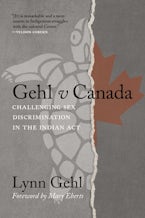How the Gehl decision advanced indigenous rights in Canada
“[R]emarkable . . . a monument in Indigenous struggles with the colonial Crown.” —Veldon Coburn, Institute of Indigenous Research and Studies, University of Ottawa
A follow-up to Claiming Anishinaabe, Gehl v Canada is the story of Lynn Gehl’s lifelong journey of survival against the nation-state’s constant genocidal assault against her existence. While Canada set up its colonial powers—including the Supreme Court, House of Commons, Senate Chamber, and the Residences of the Prime Minister and Governor General—on her traditional Algonquin territory, usurping the riches and resources of the land, she was pushed to the margins, exiled to a life of poverty in Toronto’s inner-city.
With only beads in her pocket, Gehl spent her entire life fighting back, and now offers an insider analysis of Indian Act litigation, the narrow remedies the court offers, an important critique of the methodology of legal positivism, and an analysis of obfuscating parliamentary discourse. Drawing on social identity and Indigenous theories, the author offers Disenfranchised Spirit Theory, revealing insights into the identity struggles facing Indigenous Peoples to this day.
“Gehl embodies essential Indigenous wisdom, bravery, and responsibility in her work to dismantle the systems of colonial oppression. Her work serves as a beacon in a network of pathways for our people to make their way home.” —Chief Wendy Jocko, Algonquins of Pikwàkanagàn First Nation
“The legal decision in Gehl v Canada will have profound effects for the future, ensuring that hundreds of thousands of Indigenous mothers will be able to pass their status on to their children. This victory, the product of decades of struggle by Lynn Gehl, is chronicled here. Read it and learn!” —Bonita Lawrence, author of Fractured Homeland

